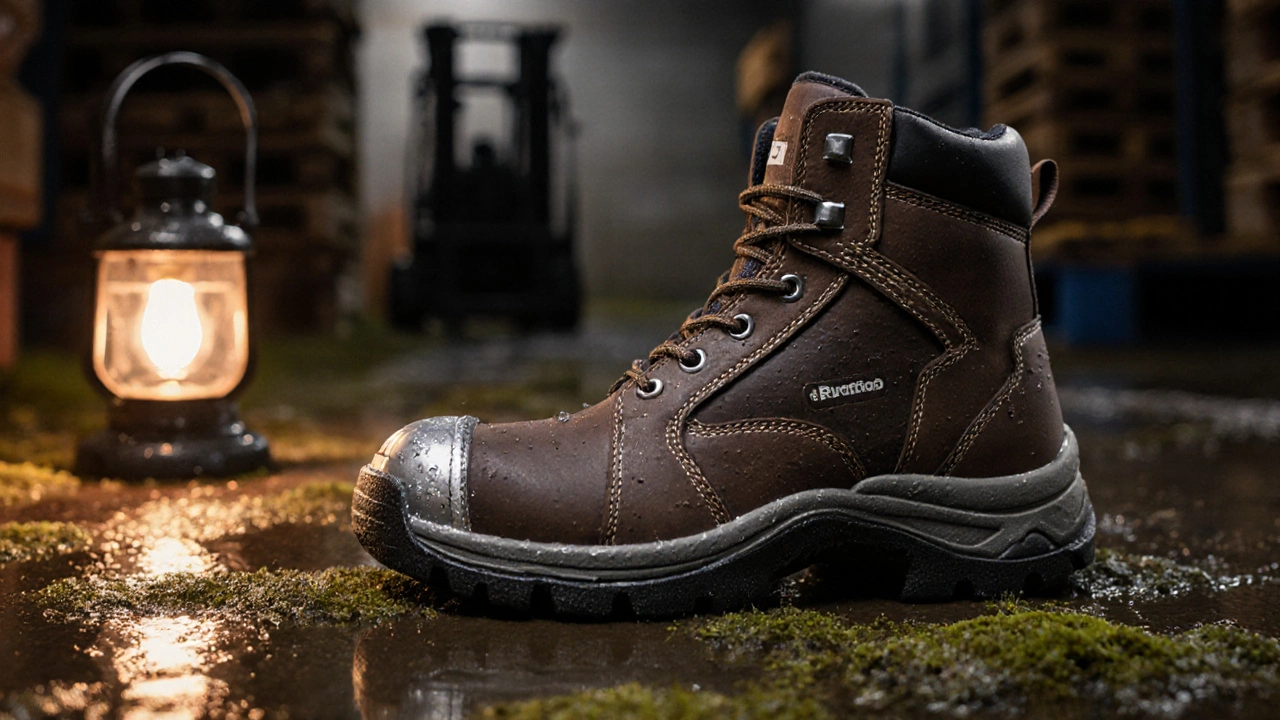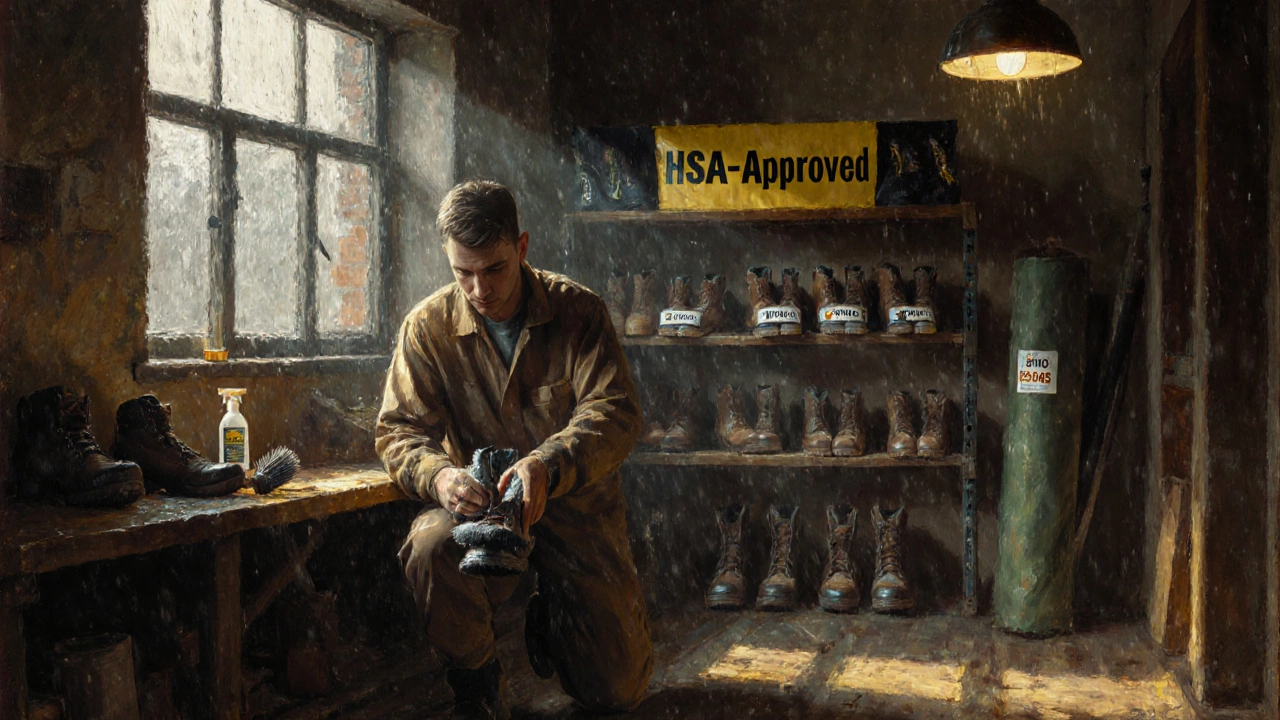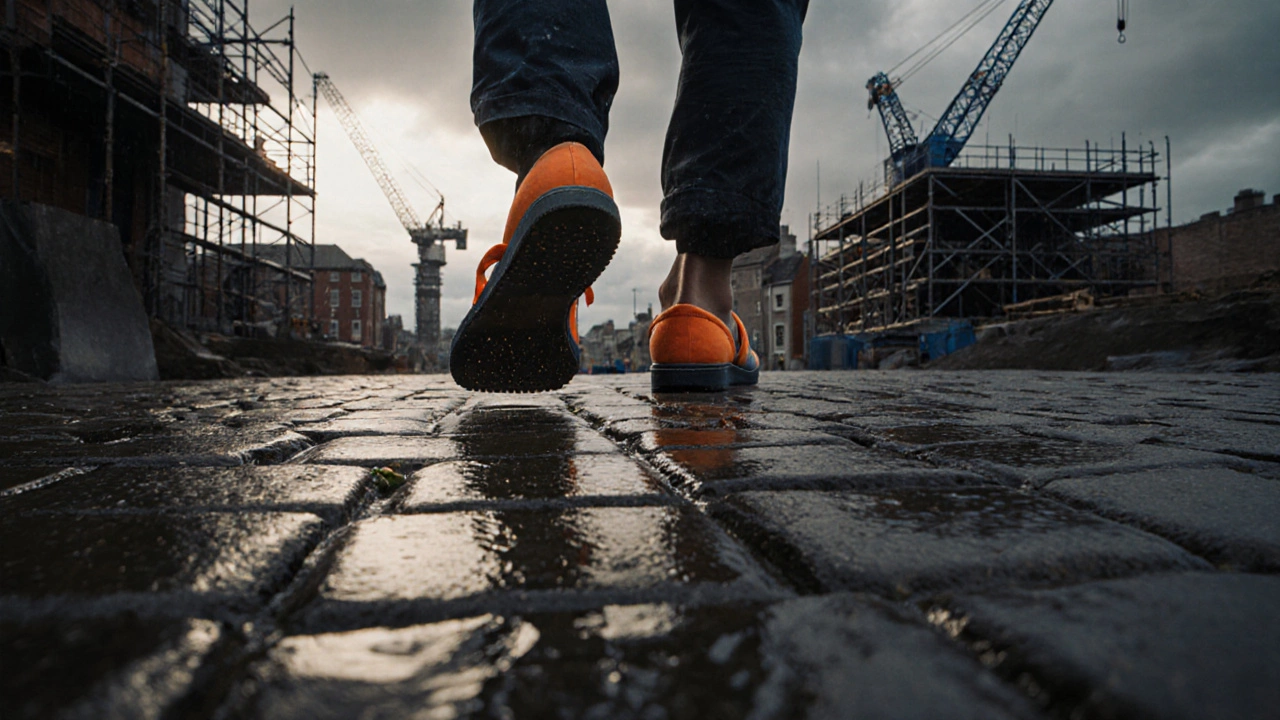Work Footwear Safety Checker
Is Your Footwear Safe for Irish Job Sites?
Check if your work shoes meet Irish Health and Safety Authority standards for construction and industrial sites. Select your footwear features to get a safety assessment.
Safety Assessment
When you step onto a construction site or a warehouse floor in Ireland, the last thing you want is a shoe that puts you at risk. The Irish market demands footwear that can cope with wet cobblestones, icy mornings in Dublin and the occasional rain‑soaked workday in Galway. Below we break down the types of shoes you should never wear on a job site, why they’re dangerous, and what safe alternatives look like for the Irish workforce.
Quick Takeaways
- Leave sandals, flip‑flops, and open‑toe shoes at home - they offer no protection against drops or punctures.
- High‑heeled or dress shoes can cause ankle injuries on uneven surfaces.
- Even classic canvas sneakers may slip on wet Irish pavement; choose slip‑resistant soles instead.
- Invest in unsafe work footwear Ireland guidelines: steel or composite toe, puncture‑resistant, and waterproof.
- Check HSA regulations and employer safety policies before buying.
Why Footwear Matters on Irish Job Sites
Ireland’s climate is famously changeable - one minute you’re walking on dry grass in County Kerry, the next you’re battling a sudden downpour in Cork. Wet stones, moss‑covered paths, and occasional ice in winter make slipping a real threat. Add heavy tools, moving machinery, and the occasional stray nail, and the need for robust foot protection becomes crystal clear.
Employers in Ireland must follow the Irish Health and Safety Authority (HSA) guidelines, which reference European EN standards for safety footwear. Violating those standards can lead to fines, work‑stop orders, or even compensation claims if an accident occurs.
Footwear That Should Never Be Worn on a Job Site
Here’s a straight‑forward list of the most common offenders:
- Sandals and flip‑flops - Open‑toed designs expose toes to falling objects and provide zero ankle support. The thin sole offers no grip on wet cobbles or oily factory floors.
- Open‑toe shoes (e.g., certain summer loafers) - Like sandals, they lack toe protection and can trap debris that leads to puncture injuries.
- High‑heeled dress shoes - The elevated heel makes you prone to ankle twists on uneven ground, a common scenario on historic sites in Dublin’s Temple Bar area where pavement irregularities abound.
- Dress shoes with smooth leather soles - While stylish, they become slippery the moment rain hits the streets of Limerick’s Riverside Walk.
- Standard canvas sneakers - Though comfortable, they typically lack the slip‑resistance required for wet Irish weather and often have thin midsoles that can be pierced by sharp objects.
- Crocs or similar foam clogs - The soft material can be crushed under heavy loads, and the open design does not protect against falling hammers or concrete.
- Slippers - Designed for indoor comfort, they provide no toe or ankle protection and slip easily on wet surfaces.
- Heeled boots - Even if they have a sturdy toe cap, the heel can cause loss of balance on uneven or icy ground, a real hazard on County Donegal’s rural sites.

Understanding the Risks Behind Bad Footwear
Each of the shoes above fails at least one of the critical safety functions defined by the HSA:
- Impact protection - Steel or composite toe caps absorb the force of dropping a 20‑kg tool. Open‑toe shoes offer none.
- Puncture resistance - Slip‑resistant soles with a puncture‑proof plate prevent nails or shards from piercing the footbed. Canvas sneakers lack this barrier.
- Electrical hazard protection - Certain jobs around power lines require footwear that won’t conduct electricity. Regular shoes can become a conduit.
- Slip resistance - The “R” rating (high slip resistance) is essential for wet Irish streets; smooth soles fail this test.
- Waterproofing - Ireland’s frequent rain means your feet can get soggy, leading to blisters and loss of grip. Non‑waterproof shoes soak quickly.
Safe Alternatives: What to Wear on an Irish Job Site
Below are the footwear types that meet HSA and EN standards and are suited to Ireland’s climate:
- Safety boots - Full‑length leather or synthetic uppers with ankle support, ideal for uneven terrain.
- Steel toe boots - Provide up to 200J impact protection, perfect for construction sites in Dublin Port.
- Composite toe shoes - Lighter than steel, non‑conductive, great for electrical work near the Shannon Bridge.
- Slip‑resistant shoes - Outsole rated “R” or “SR” according to EN ISO 20345; essential for wet kitchen‑ware factories in Cork.
- Electrical hazard footwear - Certified to reduce the risk of electric shock, mandated for electricians working on the Dublin‑Belfast interconnector.
- Waterproof or water‑resistant uppers - Keep feet dry during Galway’s frequent rain showers.
- Metatarsal guards - Extra protection for heavy‑load environments, such as shipyards in Belfast (Northern Ireland).
How to Choose the Right Pair for Irish Conditions
When shopping for work shoes, keep these criteria in mind:
- Fit and comfort - Aim for a snug heel cup but enough room for thick wool socks during winter.
- Toe protection rating - Look for “200J” (impact) and “15kN” (compression) in the product specs.
- Puncture‑proof plate - Verify the outsole meets EN ISO 20345‑4.
- Slip‑resistance - Search for the “R” or “SR” marking. Some Irish retailers label this as "Irish Slip‑Proof".
- Electrical rating - If you work near live circuits, the boot should be “EH” certified.
- Waterproofing - Look for Gore‑Tex or PU‑coated leather suitable for the damp Atlantic coast.
- Durability - Reinforced stitching and replaceable midsoles extend lifespan, which matters for the busy Dublin construction season.

Where to Buy Reliable Work Footwear in Ireland
Many Irish towns host specialist safety‑gear stores. Here are a few trusted options:
- Screwfix Ireland - Nationwide chain with a solid selection of steel‑toe and composite‑toe boots, plus free delivery to Dublin and Cork.
- Woodie’s - Offers a range of slip‑resistant shoes and often runs seasonal sales on waterproof work boots.
- The Safety Store (Dublin) - A boutique outlet specializing in HSA‑approved footwear, perfect for bespoke metatarsal guards.
- Galway Hardware - Carries regional brands that understand the wet climate, such as “Irish‑Made SafeSteps”.
- Online Irish retailers - Websites like SafetyShop.ie let you filter by EN standards, toe type, and slip rating.
Brands you’ll frequently see include Caterpillar, Dr.Martens (the “Industrial” line), and the locally‑produced “SafeSteps” range, which advertises a 5‑year warranty against puncture.
Compliance and Regulations You Must Know
The Construction Industry Federation (CIF) recommends that all employers conduct a risk assessment per the Safety, Health and Welfare at Work (General Requirements) Regulations 2007. Part of that assessment is ensuring each worker’s foot protection meets the EN ISO 20345 standard.
Employers should keep a record of footwear models, purchase dates, and inspection logs. Workers must replace shoes that show worn‑out soles, cracked toe caps, or reduced slip resistance - often after 12‑18 months of heavy use in Irish weather conditions.
Maintenance Tips for Irish Weather
- Clean mud and salt residues after each shift - residues can degrade slip‑resistant compounds.
- Air‑dry boots away from direct heat to prevent leather cracking.
- Apply a water‑repellent spray quarterly, especially before the rainy season.
- Inspect toe caps and midsoles weekly; replace if you notice dents or thinning.
Keeping your footwear in top shape not only extends its life but also maintains the safety certifications required by Irish law.
Frequently Asked Questions
Can I wear regular leather work boots on a construction site?
Only if the boots meet EN ISO 20345 standards for impact, compression, slip resistance, and puncture protection. Many plain leather boots lack these certifications, so double‑check the label before using them on site.
Are composite toe shoes safe for electrical work?
Yes. Composite toe caps don’t conduct electricity, making them ideal for electricians. Ensure the shoe also carries the “EH” (Electrical Hazard) rating for full protection.
What slip‑resistance rating should I look for in Ireland?
The EN ISO 20345 standard uses the “R”, “S”, and “SR” ratings. For wet and icy conditions common in the Irish climate, aim for at least an “R” (high) rating.
How often should I replace my safety boots?
Most experts recommend replacing them every 12‑18 months, or sooner if the toe cap shows dents, the outsole is worn, or the leather cracks from the damp Irish weather.
Where can I find certified footwear in rural Ireland?
Local hardware stores such as County Donegal’s Donegal Tools or the Kerry‑based Clonakilty Safety Supply often stock HSA‑approved boots. Online Irish retailers also ship nationwide.
